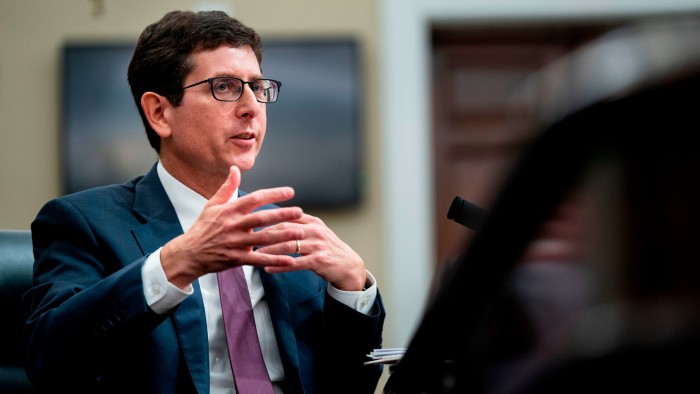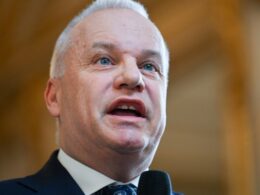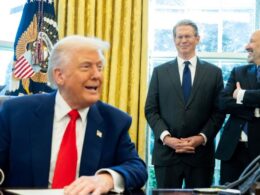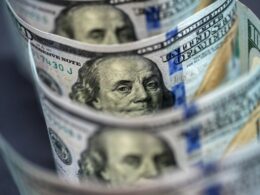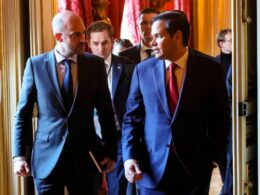Unlock the White House Watch newsletter for free
Your guide to what Trump’s second term means for Washington, business and the world
The Wall Street ructions sparked by President Donald Trump’s trade war could be a “tipping point” for foreign investors’ willingness to hold US assets, the head of Congress’s fiscal watchdog has warned.
“Even as we move away from the volatility of April, the memory of it will still remain,” Phillip Swagel, director of the Congressional Budget Office, told the Financial Times. “Something we’re trying to figure out is will there be a lasting hesitation among global investors as they look at the US.”
Trump’s April 2 “liberation day” tariff announcement ignited acute volatility in US government debt and equity markets, with the S&P 500 share index plummeting as much as 15 per cent and borrowing costs surging.
Markets stabilised after Trump paused most of the steep “reciprocal” levies, but concerns have lingered that the president’s erratic policy shifts could puncture foreign investors’ enthusiasm for US assets. Equities in particular have outperformed global markets in recent years, prompting international investors to take large positions in them.
Swagel said that international investors’ eagerness to scoop up American assets “supports US growth, supports job creation” and facilitates the government’s ability to finance the country’s large budget deficit and sell US government debt.
The CBO is working on a set of 10-year growth and fiscal projections, due out in the summer, that will deliver its first comprehensive assessment of the Trump administration’s economic agenda at a time when concerns over the government’s finances abound.
The CBO director said he had not yet determined for sure whether the sell-off in US assets and the dollar sparked by the April 2 tariffs would have a lasting impact, saying the hard data offered little clues so far.
“Will we look back at this as the sort of tipping point that really led to big changes in the global economy and a diminished role for the US? Or will this be an episode of volatility that is overcome by other policies that improve growth [such as tax cuts and deregulation] and more stability?” he said.
The US this week clinched the first deal since Trump launched his trade war, forging an agreement with the UK. But investors remained concerned over Washington’s ability to strike deals with other, larger trading partners like China. They are also waiting to see how the president’s other flagship policies, including calls for tax cuts and deregulation, will play out.
“It’s natural to think about tariffs given the volatility of April, but there’s so many other aspects to the US economy. It could be the tariff part stabilises and then the administration makes progress in other areas,” the CBO director said. “That would be a positive outcome. Or it could be we look back and say, that was the beginning of a period of slower growth.”
Swagel said it was “part of the constellation of worries that a hesitation among global investors to put capital into the US, or even just to rebalance in a way that diminishes their interest in US securities, would affect the dollar.”
The sentiment among senior global financial officials — many of which represent countries that hold substantial dollar reserves — at this year’s spring meetings for the IMF and World Bank was “really the most negative I can remember”.
“Since then it’s my sense that sentiment has gone from super negative to more wait and see. So that’s an improvement,” he added.
The Trump administration has acknowledged the “short-term pain” from tariffs, but believes it is a price worth paying to bring manufacturing back home. It also touts the levies’ potential to raise revenue and lower the federal deficit.
Treasury secretary Scott Bessent plans to halve the deficit from 6.4 per cent in 2024 to 3 per cent by the end of the president’s second term.
Swagel said it was “certainly possible” that the Treasury secretary could hit his goal. “The combination of stronger growth and spending restraint together could reduce the deficit. How much would depend on the particulars.”
The CBO is awaiting the passage of a key budget measure, known as a “reconciliation” bill, to assess the impact of the new administration’s policies before producing its summer forecasts.
Its previous outlook, published in March, showed US debt topping its post second world war high later this decade.
“We just need to wait and see what comes out,” Swagel said, adding that its projections would also depend on the path of interest rates and cuts made by Elon Musk’s so-called “Department of Government Efficiency”.
Trump wants the bill passed by July 4. Bessent said on Friday that Congress needed to act by mid-July or risk breaching the debt ceiling by August.
The bill is set to include measures that would make tax cuts enacted during Trump’s first term permanent — which CBO has said would add $6tn to deficits over the next 10 years.
The CBO has said that a 10 per cent blanket tariff would lower deficits by $2.2tn over the next 10 years. But higher charges would not necessarily raise revenues by commensurate amounts.
“From a 10 per cent universal tariff to 20, the revenue would not increase 1 to 1,” he said. “At some point, if the high tariffs are sustained, those will have broader [negative] economic impacts.”
Source link





